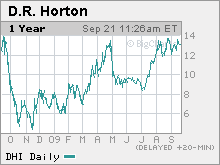D.R. Horton stock is hot
Shares of the biggest U.S. homebuilder are in the midst of their biggest rally since 2005. But is it for real?
 |
| The Bear: David Goldberg, UBS |

 |
| The Bull: Ken Leon, Standard & Poor's |
| MMA | 0.69% |
| $10K MMA | 0.42% |
| 6 month CD | 0.94% |
| 1 yr CD | 1.49% |
| 5 yr CD | 1.93% |
NEW YORK (Fortune) -- The housing market is still struggling, but D.R. Horton stock is surging.
Shares of the largest U.S. homebuilder have risen more than 80% this year (vs. an 18% rise in S&P 500) as buyers respond to the $8,000 tax credit for first-time homebuyers, relatively low mortgage rates, and a drop in prices.
Even as sales improve, however, Horton (DHI, Fortune 500), known for affordable houses in the Sunbelt, continues to lose money. In the third quarter it reported its ninth straight quarterly loss after it wrote down the value of land for development purchased in peak years.
Can Horton shares continue their run? We talked to two analysts for their take.
D.R. Horton's stock has run up 56% since July. We think a lot of the rise was based on unrealistic expectations of a V-shaped recovery in the housing market. We expect a housing recovery to be gradual.
We downgraded the stock to a sell rating in early September.
D.R. Horton has a very large land position -- it controls about 115,000 lots. It has written off $4.8 billion since 2006 as land prices plummeted, but that's less than other builders relative to tangible equity. That means Horton's future write-offs are likely to increase.
Horton is a good operator and runs a very lean company. But right now buyers are concentrated on price. As foreclosure rates stay high and those foreclosed homes come on the market, Horton will have to offer lower prices.
It seems like foreclosures are going to be relatively high for a long time. So even if D.R. Horton doesn't have pricing pressure, it certainly is not going to have pricing power.
In the last quarter the decline in unit volumes was well below our forecast, but we think the company is cutting prices more aggressively to generate sales.
Now, the company should do a good job taking advantage of the demand that's created with the $8,000 tax credit. But right now we tend to favor homebuilders who don't have big land positions because they reload faster with better quality land that has been bought at better prices.
We think Horton will fall to $10.
Housing markets are not strong today, nor do we believe they will be strong for most of 2010, but they are stabilizing. And things are getting better for D.R. Horton.
From March to June it had an uptick in net home orders and sales, and an increased backlog of homes to be built. Its $1.1 billion backlog -- up from $889 million in December -- gives a sense of the revenue it can record for the next six to nine months. That's impressive given that Horton has a lot of exposure to the Sunbelt.
We try to look at early indicators at the homebuilder level. So this is a micro vs. macro. We have seen a significant falloff in the amount of writeoffs taken by Horton for its inventory of land, houses, or even investments and joint ventures. It alone has written off $4.8 billion since 2006. That is easing.
We're hopeful that the $8,000 federal tax credit is not a onetime phenomenon, but rather is a good kick-start that keeps the housing market going into 2010.
Private builders have dominated this industry. Now, as they go bankrupt because banks aren't lending, public builders like Horton are likely to gain share. Next year we expect public builders' market share to be in the low- to mid-30% range, from 25% in 2008.
Those are positive trends and we still think mortgage rates and new home prices are going to be attractive for the next 6-12 months. Our 12-month target price for Horton stock is $14. ![]()
-
 The retail giant tops the Fortune 500 for the second year in a row. Who else made the list? More
The retail giant tops the Fortune 500 for the second year in a row. Who else made the list? More -
 This group of companies is all about social networking to connect with their customers. More
This group of companies is all about social networking to connect with their customers. More -
 The fight over the cholesterol medication is keeping a generic version from hitting the market. More
The fight over the cholesterol medication is keeping a generic version from hitting the market. More -
 Bin Laden may be dead, but the terrorist group he led doesn't need his money. More
Bin Laden may be dead, but the terrorist group he led doesn't need his money. More -
 U.S. real estate might be a mess, but in other parts of the world, home prices are jumping. More
U.S. real estate might be a mess, but in other parts of the world, home prices are jumping. More -
 Libya's output is a fraction of global production, but it's crucial to the nation's economy. More
Libya's output is a fraction of global production, but it's crucial to the nation's economy. More -
 Once rates start to rise, things could get ugly fast for our neighbors to the north. More
Once rates start to rise, things could get ugly fast for our neighbors to the north. More







